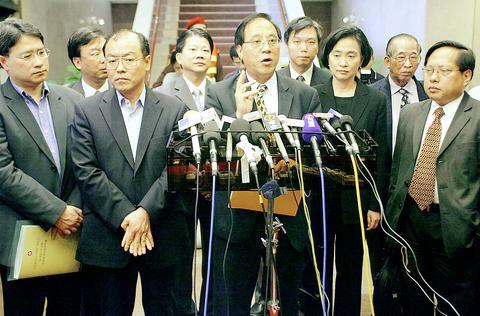Seeking to ease rising political tensions, Chief Executive Tung Chee-hwa (
Tung called the session "useful" and said he looks forward to "more communication and less dispute" with the pro-democracy lawmakers. But Tung declined to take questions from reporters.

PHOTO:AFP
Lawmakers who met with Tung in his office said he had refused to give them any timetable for starting discussions on political reforms. They attacked his decision a day earlier to send a recommendation to Beijing on the matter without reflecting the will of the Hong Kong public.
"The spirit of this meeting was polite but unhappy," said Yeung Sum (
"He himself is an obstacle to full democracy," said lawmaker Frederick Fung (
Tung angered many in Hong Kong on Thursday by sending a report to Beijing that suggested the territory's electoral systems should be reformed in time for the leadership election in 2007 that will choose his successor, as well as the 2008 Legislative Council elections.
Critics say he acted hastily and without consulting the public -- just days after Beijing asserted control over any political reforms here by saying it must approve any changes in advance.
Tung recommended nine guidelines for political reforms that his opponents claim have effectively killed any hopes of full democracy in the near term.
Yeung said the pro-democracy lawmakers "can't accept" the way Tung handled the matter. They urged him to send Beijing a supplementary report that would outline the public's democratic aspirations, but he refused.
Tung's proposal on Thursday contained no specifics for change, but he said there was no point in going into any details unless the Chinese government agrees it will be possible to modify Hong Kong's electoral methods.
The English-language daily The Standard said: "Tung roadblocks blunt vote hopes." However, Bei jing's allies defended Tung.
The pro-China daily Ta Kung Pao said that by taking an initiative within days of Beijing's ruling, Tung had shown he was "handling the issue on political reform with an active attitude, with no delay."
The Wen Wei Po daily lashed out at pro-democracy politicians, saying their pleas for more consultation were a delaying tactic to help them "fish in troubled waters and gain votes in the September elections."

The High Prosecutors’ Office yesterday withdrew an appeal against the acquittal of a former bank manager 22 years after his death, marking Taiwan’s first instance of prosecutors rendering posthumous justice to a wrongfully convicted defendant. Chu Ching-en (諸慶恩) — formerly a manager at the Taipei branch of BNP Paribas — was in 1999 accused by Weng Mao-chung (翁茂鍾), then-president of Chia Her Industrial Co, of forging a request for a fixed deposit of US$10 million by I-Hwa Industrial Co, a subsidiary of Chia Her, which was used as collateral. Chu was ruled not guilty in the first trial, but was found guilty

‘DENIAL DEFENSE’: The US would increase its military presence with uncrewed ships, and submarines, while boosting defense in the Indo-Pacific, a Pete Hegseth memo said The US is reorienting its military strategy to focus primarily on deterring a potential Chinese invasion of Taiwan, a memo signed by US Secretary of Defense Pete Hegseth showed. The memo also called on Taiwan to increase its defense spending. The document, known as the “Interim National Defense Strategic Guidance,” was distributed this month and detailed the national defense plans of US President Donald Trump’s administration, an article in the Washington Post said on Saturday. It outlines how the US can prepare for a potential war with China and defend itself from threats in the “near abroad,” including Greenland and the Panama

DEADLOCK: As the commission is unable to forum a quorum to review license renewal applications, the channel operators are not at fault and can air past their license date The National Communications Commission (NCC) yesterday said that the Public Television Service (PTS) and 36 other television and radio broadcasters could continue airing, despite the commission’s inability to meet a quorum to review their license renewal applications. The licenses of PTS and the other channels are set to expire between this month and June. The National Communications Commission Organization Act (國家通訊傳播委員會組織法) stipulates that the commission must meet the mandated quorum of four to hold a valid meeting. The seven-member commission currently has only three commissioners. “We have informed the channel operators of the progress we have made in reviewing their license renewal applications, and

A wild live dugong was found in Taiwan for the first time in 88 years, after it was accidentally caught by a fisher’s net on Tuesday in Yilan County’s Fenniaolin (粉鳥林). This is the first sighting of the species in Taiwan since 1937, having already been considered “extinct” in the country and considered as “vulnerable” by the International Union for Conservation of Nature. A fisher surnamed Chen (陳) went to Fenniaolin to collect the fish in his netting, but instead caught a 3m long, 500kg dugong. The fisher released the animal back into the wild, not realizing it was an endangered species at